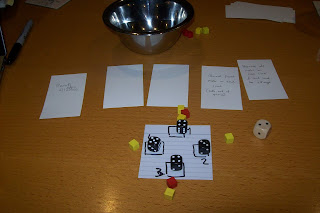The idea that had been bouncing around my head since the start of the month was about a vampire, holed up in his castle, being assaulted by hordes of angry villagers with pitchforks and torches. That sort of set-up is plenty enough to be a valid entry for the contest, and as I thought things over, a plan developed for a simple tower defence solitaire game, with lines of angry villagers attacking the castle from four sides, maybe with dice controlling what they do, and the player gets to (...mumble, mumble...) in defence.
 |
| Castle Crumpula: the first prototype. Totally functional, if nothing else. |
By the time I started my 24 hours (and was officially allowed to actually make notes and stuff) I had managed to avoid forgetting everything I had been thinking about, and things had crystalised a bit. I made an initial prototype, with cubes representing villagers, dice representing the strength of the four sides of the castle, and another die controlling where new villagers arrived. I also made some cards with special powers on that the player could use to defend the castle, which you flip over to use, and flip back again when (...mumble, mumble...). I quickly added a few "special" villager mobs which brought friends with them, making the rate of their build-up less predictable.
Over a few test plays (including one with my long-suffering daughter) things developed some more. I added an additional "braver" type of villager, made tweaks to the vampire powers (actually changing them less than I thought I would) and gradually upgraded the prototype components to a submittable form.
The game is still very luck-based, probably with too low a chance of winning, and can sometimes take too long to come to a conclusion, but I'm pretty content with it. I have all sorts of ideas for relatively simple ways to make the game graphically more interesting, and upgrade the components by mounting them on foamcore board, but the time constraint doesn't really allow such niceties, and I feel it is also good to keep things reasonably printer friendly.
 |
| Castle Crumpula: the version submitted to the contest. A bit prettier and a bit more functional. |
So, if you are interested, here is my entry on the contest thread, which includes links to download the rules and components. If you do take a look, then it's worth looking through the rest of the thread. There are some great looking other entries in there; it looks like this is a vintage month.
Edit: If you would like to see the full set of entries, here is the voting list.


